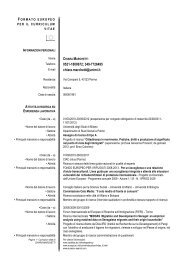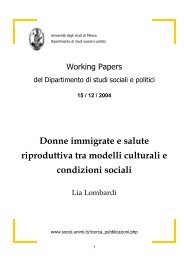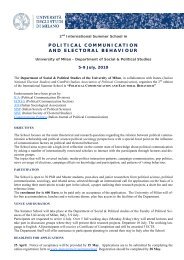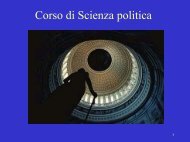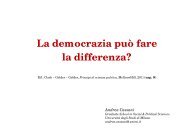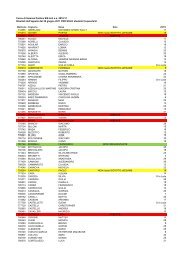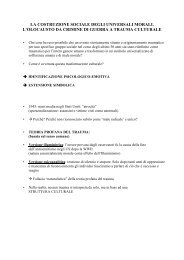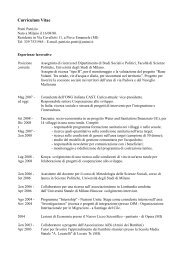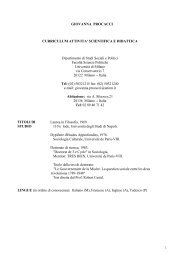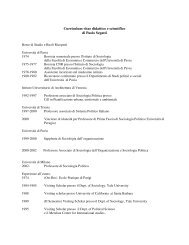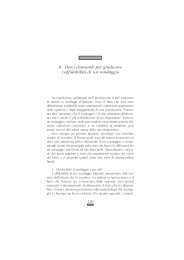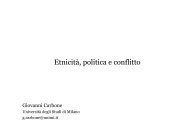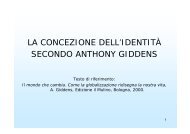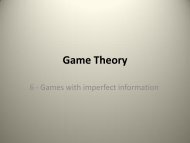The european dimension of political discourse in Italy. A ... - CIRCaP
The european dimension of political discourse in Italy. A ... - CIRCaP
The european dimension of political discourse in Italy. A ... - CIRCaP
Create successful ePaper yourself
Turn your PDF publications into a flip-book with our unique Google optimized e-Paper software.
THE EUROPEAN DIMENSION OF POLITICAL DISCOURSE IN ITALY.<br />
1. Party elites, <strong>political</strong> <strong>discourse</strong> and European Integration. Conceptual clarifications<br />
and research strategies *<br />
<strong>The</strong> puzzle: understand<strong>in</strong>g the transformations <strong>of</strong> party elite attitudes towards European<br />
<strong>in</strong>tegration<br />
This chapter <strong>in</strong>tends to provide a broad long-term analysis <strong>of</strong> the chang<strong>in</strong>g significance <strong>of</strong> the<br />
question <strong>of</strong> European <strong>in</strong>tegration (and <strong>of</strong> some related issues) <strong>in</strong> the <strong>discourse</strong> <strong>of</strong> the most<br />
important <strong>political</strong> parties <strong>in</strong> <strong>Italy</strong>, dur<strong>in</strong>g the last fifty years. Pursu<strong>in</strong>g this general goal will<br />
give us the opportunity to provide an orig<strong>in</strong>al contribution to a grow<strong>in</strong>g debate on the pro/anti-<br />
European attitudes <strong>of</strong> <strong>political</strong> parties with<strong>in</strong> the European Union (Hix and Lord 1997;<br />
Hooghe et al. 2002; Marks 1999; Ray 1999; Ladrech 2000; Szczerbiak and Taggart 2002)<br />
and, at the same time, it will help us to explore the cognitive problem raised by the broad<br />
research undertak<strong>in</strong>g the present contribution ascribes to: to what extent has the <strong>political</strong><br />
<strong>discourse</strong> on European <strong>in</strong>tegration followed/preceded the changes <strong>in</strong> the whole perception <strong>of</strong><br />
the public op<strong>in</strong>ion and/or other external pressures? In other words, the rationale <strong>of</strong> this<br />
chapter recalls an old question about the actual impact <strong>of</strong> <strong>political</strong> elites on the process <strong>of</strong><br />
Community build<strong>in</strong>g (Slater 1982), which is very simple <strong>in</strong> its formulation, but particularly<br />
challeng<strong>in</strong>g <strong>in</strong> its practical exploration, when one has to pass from an impressionistic image<br />
<strong>of</strong> party elites’ capability to shape the policy agenda and form the collective op<strong>in</strong>ions, to a<br />
more precise account <strong>of</strong> the relationship among these elements.<br />
In <strong>Italy</strong>, some simplified views tend to rapidly solve the question, push<strong>in</strong>g a specific argument<br />
and keep<strong>in</strong>g the rest <strong>of</strong> the scene like a fixed, <strong>in</strong>significant background. For <strong>in</strong>stance, the<br />
idea that Italian <strong>political</strong> elites used to “import” the European perspective, as an answer to<br />
balance the low degree <strong>of</strong> democratic satisfaction affect<strong>in</strong>g the Italian public op<strong>in</strong>ion, is quite<br />
recurrent. Probably there is some truth <strong>in</strong> this argument, and it fits the unquestionable image<br />
<strong>of</strong> a prolonged dest<strong>in</strong>y <strong>of</strong> European loyalty <strong>of</strong> Italian <strong>political</strong> elites (Cotta 1998). On the other<br />
hand, while historians have been traditionally concerned with the causes <strong>of</strong> some peculiar<br />
attitudes <strong>of</strong> the Italian parties (namely, the multifaceted Atlanticism/Europeanism <strong>of</strong> Christian<br />
Democracy, or the particular Eurocommunism <strong>of</strong> the Communist party), a rather <strong>in</strong>sufficient<br />
effort has been done, especially <strong>in</strong> terms <strong>of</strong> empirical analysis, to explore the dynamic <strong>of</strong><br />
change <strong>in</strong> the “European vocation” <strong>of</strong> Italian <strong>political</strong> elites. We know, for <strong>in</strong>stance, that<br />
* <strong>The</strong> paper is the fruit <strong>of</strong> a jo<strong>in</strong>t reflection. Nonetheless, N. Conti is particularly responsible for sections<br />
2 and 3, while L. Verzichelli for sections 1 and 4. We thank Maurizio Cotta for his valuable comments<br />
on earlier versions <strong>of</strong> this work. We would also like to thank all the participants to the sem<strong>in</strong>ar held at<br />
<strong>CIRCaP</strong>, University <strong>of</strong> Siena, on 27 May 2002. We are also grateful to Daniele Pasqu<strong>in</strong>ucci for his<br />
advice on historical sources and <strong>in</strong>terpretations.<br />
3



